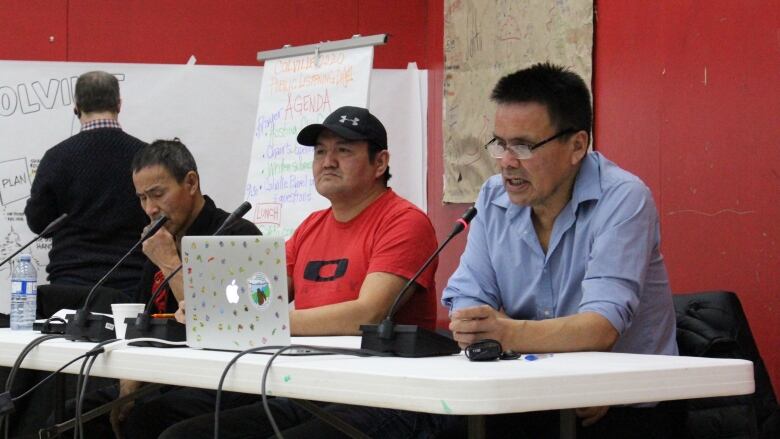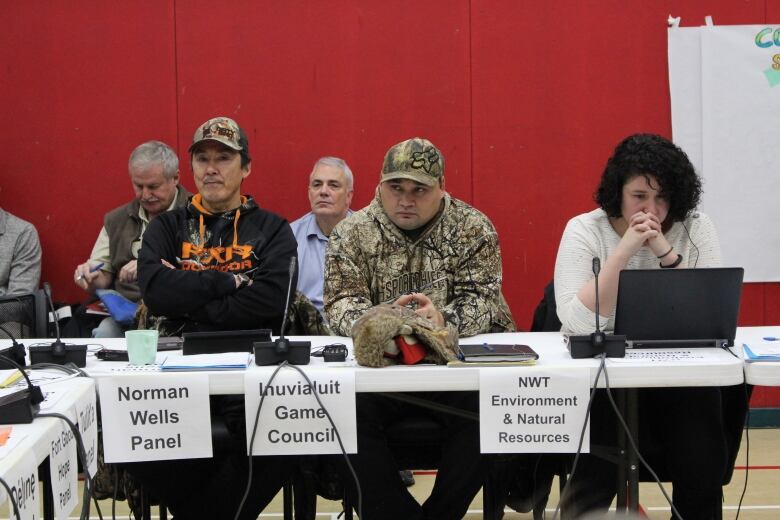Colville Lake makes pitch for local control on 1st day of Sahtu caribou hearings
Plan hopes to avoid 'colonial system of control' including tags and harvest quotas

Leaders from Colville Lake, N.W.T., say the government should allow them to lift hunting quotas and replace them with local regulations guided by Dene law.
"We're trying to make sure our way of life is relevant," said David Codzi, president of Colville Lake's Ayoni Keh Land Corporation. "We've been doing this for too long to say that it's wrong."
The community's locally-developed caribou conservation plan was presented as the first act of business at a three-day "public listening session" on the caribou harvest, organized by the Sahtu Renewable Resources Board.The sessions have brought more than 60 visitors to the small community of about 130 people, and have been well-attended.
According to the plan, one goal is to "avoid intervention" by the territory's Department of Environment and Natural Resources to regulate harvest through tags or quota systems,which it calls an "unprecedented colonial system of control."
In their place, the plan proposes a bottom-upmanagement system based on mutual respect for and "inter-dependence with d," the traditional name for caribou.

It also says conservation efforts must be guided by the wisdom of elders and the community's traditional law, or ea. Among the ea principles, the plan outlines are respect for the land, sharing and a belief "that all things have a spirit and are interconnected."
Colville Lake's caribou conservation plan proposes the revitalization of the community's traditional lawthrough the documentation of harvesting customs, the development of new research standards, and educating youth.
Plan significantly empowers local council
The plan would significantly empower Colville Lake's local renewable resource council, which it asserts is better placed to assess the conservation needs of the herd.
Government departments are too "siloed" to take the holistic approach to conservation possible on a local level, according to the plan.
Reporting harvest numbers may be alien to the customs of the Dene- Colville Lake's caribou conservation plan
It commits Colville Lake's authorities to establish and enforce local guidelines. It would also collect and share harvest numbers with partners in the territorial government.
"Although reporting harvest numbers may be alien to the customs of the Dene, it may serve to prevent the imposition of unacceptable harvest restrictions," the plan reads.

If fully accepted, the plan would also obligate the government to consult with the local renewable resource council before permitting any proposed mineral and petroleum exploration on the caribou range.
That rangeextends well outside the territory, into Yukon and Nunavut.
The plan also asks that the government and exploration companies to consider reportingannually "what they are doing on the land."
Approval pending
The plan must be approved by the Sahtu Renewable Resources Board in its list of decisions produced from the session, due to be released Mar. 31.
Then it will head to the territorial government, whichwill need to decide if and how to implement it under the territory's Wildlife Act.
A similar local management plan produced by the community of Deline was endorsed by the government in 2016, but a submission to the hearings says ENR "continues to consider" aspects of the plan four years later.












_(720p).jpg)


 OFFICIAL HD MUSIC VIDEO.jpg)
.jpg)



























































































